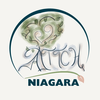Attachment and Trauma Treatment Centre for Healing (ATTCH) Niagara
Dénomination enregistrée : Attachment and Trauma Treatment Centre for Healing (ATTCH) Niagara
Numéro d'entreprise : 795094739RR0001
Cet organisme est désigné par l'Agence du revenu du Canada (ARC) comme organisme de bienfaisance enregistré. Ils se conforment aux exigences de l'ARC et ont reçu un numéro d'enregistrement d'organisme de bienfaisance.
The Attachment and Trauma Treatment Centre for Healing (ATTCH) Niagara is a non profit organization providing trauma specific therapy to marginalized populations in the Niagara Region. ATTCH Niagara integrates leading edge accelerated treatment techniques with a focus on holistic wellness to simultaneously calm the body and the mind thereby forming new neural pathways and new ways of thinking and being. Our integrative model often results in significant and lasting changes in as little as 3-4 sessions, including reductions in suicide ideation, self harming behaviours, high-risk behaviours, addictions, and post traumatic stress symptoms. ATTCH Niagara Founder and Clinical Director, Lori Gill, has created a world renowned approach for treating trauma. She is an engaging and sought after speaker who travels worldwide training people in her Integrative Trauma and Attachment Treatment Model (ITATM).
Since the onset of COVID-19 we have observed an increase in referrals for free therapy due to increased mental health, anxiety, and trauma symptoms that have been exacerbated by the pandemic and furthermore by current world events. “Stressors that can require people to isolate such as natural disasters, terrorism, or pandemics can trigger symptoms in people with histories of complex trauma….Complex trauma exposure comes in many forms including but not limited to experiencing childhood neglect or abuse; witnessing or experiencing domestic or community violence; enduring lifelong racial, cultural, religious or gendered oppression; and growing up in chaotic, unpredictable living situations in which our caregivers struggled with serious mental health issues, substance abuse, or health crises” (Presley & Spinazzola, 2020).
We have observed a four-fold increase in the need for free trauma specific therapy and have found that for many trauma survivors the isolation, uncertainty and powerlessness has activated dormant trauma symptoms or exacerbated current trauma symptoms. We want to ensure we are able to continue to meet this increased need and as such are seeking funding to meet the need for free trauma specific therapy.
